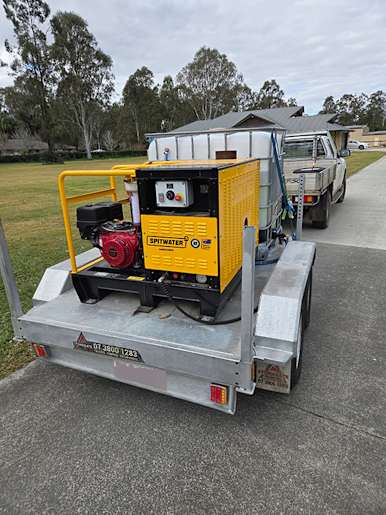
Hot water injected slowly into fire ant nests kills the pests and makes the nest unusable.

Award-winning Professor of Entomology Nigel Andrew validated the hot water injection method for removing Red Imported Fire Ants (RIFA) nests.

The current FASO machine is a prototype built in partnership with southeast Queensland farmer Trevor Hold.
A PILOT study in Ipswich and Logan has confirmed a chemical-free method for destroying red imported fire ants is not only safe but highly effective.
Using nothing but hot water, the Fire Ant Soup Operation (FASO) has achieved up to 100 percent nest death within weeks.
For Professor Nigel Andrew from Southern Cross University, the results speak for themselves.
“This is a method that absolutely works,” Professor Andrew said. “The hot water treatment has been proven overseas, and now we’ve demonstrated its success in an Australian context too.
“In the US, results range from 90 to 100 percent nest death after four or five treatments.
“Here, we reached 100 percent in just two treatments, which is incredibly promising.”
FASO uses a low-pressure probe to inject 90°C water directly into fire ant nests. It’s already in use in the United States, where it complements chemical baits and growth regulators.
Unlike chemical treatments, the hot water method leaves no toxic residue and allows immediate re-entry to treated sites – making it ideal for sports fields, organic farms, and pet-friendly properties.
What surprised Professor Andrew most was how quickly native life bounced back after treatment.
“Within three weeks, we saw soil invertebrates like worms and beetle larvae returning. By six weeks, native ants and spiders were recolonising,” he said.
“That shows this method doesn’t wipe out everything – it kills the fire ants, then lets the locals come back.”
Even better, he said FASO destroys the nest structure itself, turning it into mud and making reinfestation much harder.
“With chemical treatments, nests often remain intact – free real estate for new queens. But FASO collapses the whole nest, turning it back to dirt.”
“Further research into fire ant eradication is needed in Australia due to the unique environment of Southeast Queensland,” Professor Andrew added.
“We must evaluate and adapt existing methods to this local context.”
Southern Cross University is seeking funding to upgrade FASO machines and expand the research team.
Professor Andrew is working closely with Gatton farmer Trevor Hold and Dr Joshua King from the University of Central Florida – the developer of FASO and winner of the 2023 Theodore Roosevelt Genius Prize for innovative conservation technology.
The US$100,000 Theodore Roosevelt Genius Prize recognises innovators who use technology-driven solutions to tackle conservation challenges.
Trial Results
Over three sites, the results were:
Site 1 (37 nests): 89% nest death after one treatment, 100% after a second
Site 2 (12 nests): 58% first treatment, 92% second
Site 3 (80 nests): 36% nest death so far; further data coming
What is FASO?
• FASO (Fire Ant Soup Operation) is a non-chemical fire ant eradication method involving:
• 90°C water injected directly into the nest via probe
• Low-pressure delivery at 5 litres per minute
• Nest structure is destroyed, turning to mud
• Safe for organic farms, sensitive sites, and public spaces
• No chemical residues – safe to re-enter within minutes
• Repeatable as needed for total eradication





